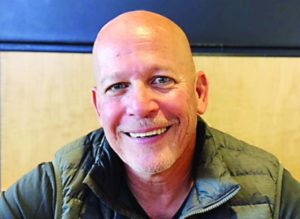When a Jewish student leaves town to attend college, some parents may worry about a continuing connection to Judaism. At Colorado College in Colorado Springs, the Hillel program fills this need.
Kobi Chumash has taught Hebrew at CC and been the faculty advisor for Hillel for some 12 years. When he arrived, programs for Jewish students were inconsistent. The students met for a Shabbat dinner once every four or five weeks. The attendance at the dinners was 20 people or fewer. Many of the students did not know how to celebrate Shabbat.
Chumash made changes in the program. He began by making the Shabbat dinners a regular occurrence. Chumash says that it was difficult for students to come to a dinner that was inconsistent, as they would have to check the school schedule to find out whether it fit into their available time that week.
Now that the dinners happen every Shabbat, there is a better chance that students will find time to attend.
The students have even requested that the Shabbat gatherings occur during block breaks, when the majority of students are out of town. These “block break” Shabbats are his favorite, says Chumash, as they are quieter, with fewer people. There is more time to relax, sit and talk.
At Colorado College, with a total student population of approximately 2,000, it is estimated that 10% of the student body is Jewish. It is difficult to determine how many Jewish students take advantage of the dinner program, as it is open to all students. Chumash estimates that of the 50 to 60 people who attend each week, two-thirds are Jewish. The rest are friends and others who are interested in Judaism, or those who wish to socialize with a free cup of wine.
The Hillel Shabbat dinners are bought and prepared by the students at the college’s Interfaith House. There is a sign-up sheet available at the beginning of each block, and the students put their names down on the date they wish to cook.
Is it difficult to find people to make the dinner? “Not at all,” replies Chumash. “They all want to do it.”
He does not know the menu in advance; it is up to the students what they will make.
“There have been many surprises on the table, some of which were very tasty.”
The meals are mostly dairy, not necessarily due to kashrut policy but to other dietary restrictions of the students.
The dinners are funded by support from the student government on campus and donations from parents and friends.
On a typical Friday night gathering, the order of the evening is as follows:
They begin with announcements (next meetings, sign-ups, other information), followed by the blessing and lighting of the Shabbat candles. Next comes the kiddush prayer over the wine. Chumash mentions that this prayer has evolved; it started out as the short one-line bracha and has lengthened into the full kiddush.
Afterward, Chumash reads a poem or song in Hebrew and a student reads it in English. Then comes the blessing for the challah and the dinner.
The Hillel Shabbat dinners at CC are open to students at all colleges in the Colorado Springs area. At least one student from the University of Colorado at Colorado Springs (UCCS) has been a regular attendee this year.
Nikki Mills is one of the student co-chairs of Hillel. She was introduced to Chumash by her parents when she first arrived as a freshman.
Now in her fourth year, she gives credit to Chumash for the success of the Shabbat dinners.
Mills reports that the weekly dinners are the most widely attended of any student government-supported event on campus. She attributes this to the method of presentation.
“It is less a Jewish event than a provision for the whole community,” Mills says.
“Being a part of Hillel is very important to me. The role of co-chair involves more work than I expected, but I am happy to be doing it.”
Mills reports that the students who attend the dinners come from a wide range of home observance. There is no attempt to educate or convert, but there are “Shabbat moments.”
In addition to the Shabbat dinners, Hillel provides a Pesach seder once a year that has a limit of 200 people (with approximately 30 seats set aside for the community), a break-the-fast at the Interfaith House, and the annual building of the sukkah on campus.
Chumash says, “We need to remember to ask the college to turn off the sprinklers for the sleepover in the sukkah. Most of the time we forget.”
Copyright © 2019 by the Intermountain Jewish News

















